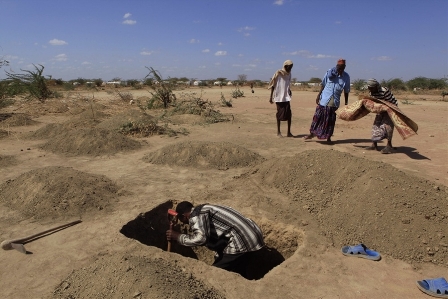
Distribution of the aid and resolving the crisis will require pooling resources from many government agencies and the armed forces. The Khaleefah can personally take charge of this or send an Assistant Khaleefah (Mu’awin Tafweed) who has the same powers as the Khaleefah in his capacity as a deputy. The Assistant Khaleefah can then take control of all government agencies and armed forces involved in the disaster relief operation, cutting bureaucracy which could delay aid distribution.
The Muslim ummah is one and its suffering is one.
مَثَلُ الْمُؤْمِنِينَ كَمَثَلِ الْجَسَدِ إِذَا أَلِمَ بَعْضُهُ تَدَاعَى سَائِرُهُ
The Messenger of Allah صلى الله عليه وسلم said: “The example of the believers is like the body, if part of it hurts the rest of it is summoned.” [Ahmed]
The wealth in the Muslim world with its abundant natural resources is immense. There should be no need to rely on America, the UN and other western powers for aid. Rather the Khilafah should be the leading nation that is giving aid not receiving it.
The Messenger of Allah صلى الله عليه وسلم said: “The upper hand is better than the lower hand (i.e. he who gives in charity is better than him who takes it). One should start giving first to his dependents. And the best object of charity is that which is given by a wealthy person (from the money which is left after his expenses). And whoever abstains from asking others for some financial help, Allah will give him and save him from asking others, Allah will make him self-sufficient.” [Bukhari, Narrated by Hakim bin Hizam]
In 1845, the onset of the Great Irish Famine resulted in over a million deaths. Ottoman Sultan Khaleefah Abdul-Majid I declared his intention to send 10,000 sterling to Irish farmers but Queen Victoria requested that the Sultan send only 1,000 sterling, because she had sent only 2,000 sterling herself. The Sultan sent the 1,000 sterling but also secretly sent 3 ships full of food. The English courts tried to block the ships, but the food arrived in Drogheda harbor and was left there by Ottoman Sailors. Due to this the Irish people, especially those in Drogheda, are friendly to the Turks.
The Khilafah is not a union of independent states like the EU or an empire where wealth is taken from the regions and concentrated in the capital. It is one state with a central government, divided up administratively in to provinces (wiliayaat). If any province of the Khilafah suffers a disaster such as a famine then funds will be collected from all other provinces to alleviate the problem. The Charities Department (Diwan as-Sadaqat) and the Public Properties department of the Treasury (Bait ul-Mal) will allocate funds to the famine. Natural resources like oil cannot be owned by individual royal families to misuse as they please, buying super cars, foreign football clubs and propping up western interest-based banks. They are public resources owned by the citizens of the Khilafah.
Distribution of the aid and resolving the crisis will require pooling resources from many government agencies and the armed forces. The Khaleefah can personally take charge of this or send an Assistant Khaleefah (Mu’awin Tafweed) who has the same powers as the Khaleefah in his capacity as a deputy. The Assistant Khaleefah can then take control of all government agencies and armed forces involved in the disaster relief operation, cutting bureaucracy which could delay aid distribution.
Alternatively the governor (wali) of the affected province could be assigned full authority over his wiliyah to manage the disaster. This would only be temporary since governors in the Khilafah have a restricted (khass) mandate to prevent independent, autonomous regions appearing.
In the year 18AH during the Khilafah of Umar ibn al-Khattab the Arabian Peninsula was struck by a severe famine and drought, and hunger grew so severe that the wild animals started coming in to the towns, and if a man slaughtered a sheep he would not be able to eat it because it was so scrawny, and the flocks died of hunger. This year was called the year of ar-Ramadah because the wind blew the dust around like ashes (ar-ramad). [Dr Ali Muhammad as-Sallabi, “Umar ibn al-Khattab his life and times,” Vol. 1, p. 409]
Umar was the Khaleefah and took personal control of resolving the famine. He made an oath that he would not taste any meat or ghee until the famine was over and the people went back to normal.
He established refugee camps in the desert for the thousands of Arabs who converged on Medina. Umar set up an institution to help the refugees and appointed workers at these camps. He divided the work up so every worker knew exactly what he was supposed to be doing, and did not duplicate the work assigned to someone else. He appointed people in different parts of Medina to supervise the distribution of food. When evening came, they would meet with him and tell him about what they had done, and he would give them further instructions. Umar also worked in the refugee camps.
Umar had already established an institution called Dar ad-Daqeeq with the purpose of distributing food to those who came to Medina. It distributed flour, saweeq, dates and raisins from its stores before supplies arrived from the other regions of the state.
Umar also wrote to all his governors in Egypt, Iraq, Persia and Syria requesting they send aid. All responded and sent huge quantities of aid to the capital.
Finally, Umar organised prayer for rain (al-istisqa) in Medina and through the regions of the Khilafah. Allah accepted this dua and it began to rain.
